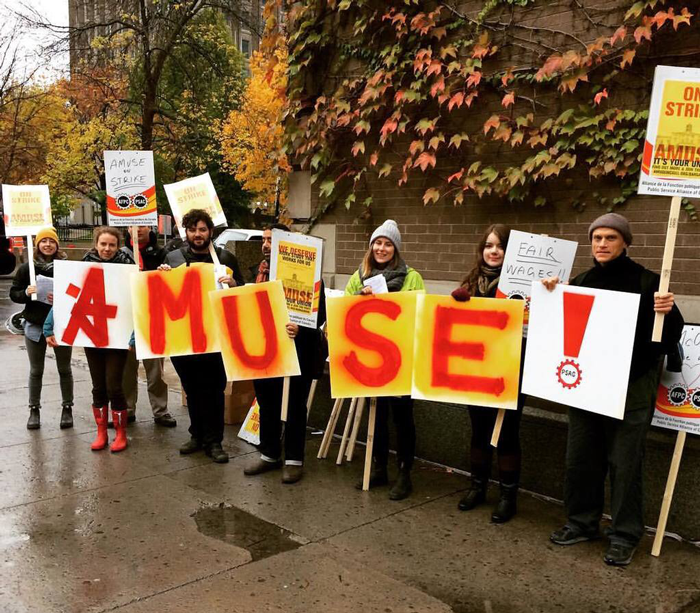On the morning of Oct. 29, the Association of McGill University Support Employees (AMUSE) went on strike. AMUSE met with members of the university administration on Oct. 28 to discuss proposed changes to their collective agreement with the university regarding the Work Study program. AMUSE announced that they would go on strike the night of Oct. 28 after the administration refused to make any concessions. The strike will last five days, concluding on the evening of Wednesday, Nov. 2. Representing over 1,500 McGill employees, AMUSE members work in the university’s libraries, gyms, residences, laboratories, and numerous other facilities.
Since May 2015, AMUSE has been in negotiations with the university’s administration to create a new collective bargaining agreement—a contract between the university and AMUSE that determines the starting wages, benefits, and non-monetary privileges afforded to casual employees. AMUSE's previous collective agreement expired in April 2015. After a number of their demands were rejected, AMUSE voted for a strike mandate on Oct. 20, which allowed the negotiating team to use the threat of a strike to pressure the university.
During the Oct. 28 meeting, AMUSE proposed changes to the Work Study program, including publicly posting job opportunities and creating a formal system for Work Study employees to provide feedback about their employment. Claire Michela, president of AMUSE and member of its negotiating team, was present at the Oct. 28 meeting.
“The university has made it clear that they won’t include the changes that we feel are necessary for our members in the collective agreement,” Michela said. “We tried all day to make a change that would suit our needs and be acceptable to the university, and we couldn’t do that, so we had to exercise our strike mandate at the end of the day, unfortunately.”
The strike is disrupting services across campus. Athletics and Recreation Services posted an update on their website that many of their facilities and services will be either disrupted or cancelled during the strike. In an email to The Tribune, Julie Fortier, communications manager at McGill Human Resources, wrote that the university is working to mitigate the impacts of the strike.
“The university has been developing contingency plans in the past few days to try to limit the impact of the strike on our operations and the activities planned for the next few days,” Fortier wrote. “This means getting some managers to fill in for some of the casual employees, if needed, or identifying tasks that will need to be postponed for now.”
AMUSE’s original collective agreement with the university requires that certain essential services, including the Mental Health Clinic, Research Animals and Farm Animals, Gross Anatomy, Pathology Laboratories, and McGill Residences, would be maintained for the duration of any strike. The administration and the AMUSE negotiating team have collaborated to create a contingency plan to continue providing these services despite the work stoppage elsewhere. Without such a plan, services like providing care for animals used in research laboratories and having a person occupying the front desks at residences during the weekends would be suspended.
“Basically, we won’t let [essential services] be harmed by having a strike,” Michela said.
In an attempt to mitigate the costs of the strike for casual employees, the Public Service Alliance of Canada (PSAC) is aiding AMUSE by providing union members who showed up to participate for shifts at AMUSE’s various picket line protests with strike pay. Jamie Cernek, U3 Political Science, works as a casual employee at both the Arts Internship Office and at McLennan Library.
“I actually don’t work on the days that the strike is happening,” Cernek said. “I know people who work on those days, […] but no one [that] really depends that much on their Work Study or casual job that they would be in dire straits.”
The AMUSE negotiating team and the McGill administration will meet on Nov. 10 to further discuss the collective agreement.
This article was last updated on Oct. 31.









